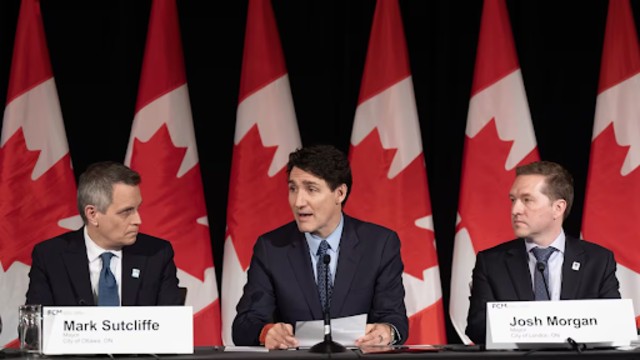
Prime Minister Justin Trudeau is meeting with big-city mayors and business leaders in Toronto to discuss the state of Canada’s economy. CP24’s Beatrice Vaisman has the latest.
Prime Minister Justin Trudeau welcomed hundreds of business leaders, policymakers, and Indigenous representatives to a major economic summit on Friday. The gathering focused on strengthening Canada’s economy as tensions with its biggest trading partner, the United States, continue to evolve.
Preparing for Uncertainty
Speaking at the event, Trudeau emphasized the need for both immediate action and long-term strategies. He urged Canadian businesses to work closely with the U.S. to prevent the imposition of new tariffs. However, he also stressed the importance of having a solid response plan if the tariffs proceed.
U.S. President Donald Trump recently announced plans for a 25% tariff on Canadian goods and a 10% levy on Canadian energy exports. While the decision is temporarily on hold until March 4, Trump made it clear that the coming weeks will determine whether a final economic agreement with Canada can be reached. Meanwhile, his administration has ordered a review of the Canada-U.S. trade relationship, with findings expected by April 1.
Calls for Trade Diversification
The uncertainty surrounding U.S. trade policies has led Canadian business leaders to push for stronger internal trade and new international partnerships. Many believe that reducing reliance on the U.S. market will help protect Canada’s economy from future disruptions.
Trudeau echoed this sentiment, saying it is time for “true free trade” within Canada while maintaining strong ties with both the U.S. and other global markets.
Summit Brings Together Key Players
The summit, organized by Canada’s newly formed advisory council on Canada-U.S. relations, brought together a diverse group of industry leaders, policymakers, and experts. Several federal ministers were in attendance, alongside representatives from the Canadian Chamber of Commerce, Global Automakers of Canada, and the Federation of Canadian Municipalities.
Flavio Volpe, president of the Automotive Parts Manufacturers Association and a member of the advisory council, said the summit should be more than just a one-time discussion. He called for ongoing collaboration to address what he described as “the most serious industrial threat” Canada has faced in recent history.
Unified Approach to Trade Challenges
Drew Dilkens, mayor of Windsor, Ontario, highlighted the importance of ensuring all levels of government and business leaders are aligned in their response to potential trade disruptions. He stressed the need for accurate information when dealing with U.S. policymakers, stating that "clarity and facts are crucial in these discussions."
To strengthen Canada’s negotiating position, mayors of border communities have formed the Border Mayors Alliance. Their goal is to advocate for policies that protect the cities most affected by U.S. tariffs.
Industry Leaders Call for Support Measures
Dennis Darby, CEO of Canadian Manufacturers and Exporters, emphasized that if tariffs are implemented, the government must step in with support measures. He suggested relief in the form of tax cuts, wage subsidies, or direct financial aid to affected businesses and workers.
Beyond immediate concerns, Darby pointed to structural challenges within Canada’s economy. He called for improvements in interprovincial trade, arguing that excessive regulations make it difficult for businesses to move goods across provinces. He also urged Canada to maximize the benefits of its international trade agreements to reduce dependence on the U.S.















